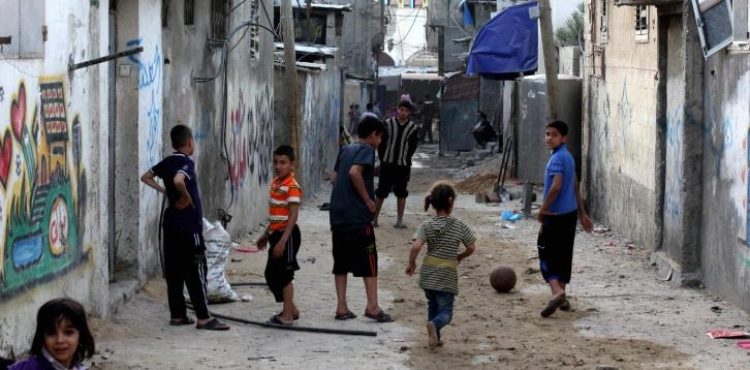Dozens of children line up in a Palestinian refugee camp in Gaza, waiting for a young artist to paint on their faces, which gives joy to them.
In one of the narrow alleys in the "Al-Shati" refugee camp in western Gaza, the children are waiting for their turn to paint the artist Mohamed Abdel-Al on their faces, while some of them went to applause and sing.
Abdel-Alal (22 years) harnesses his high talent in drawing to establish a culture of adhering to the right of return for the children of refugees. He chooses for this a variety of symbols with strong ties to the Palestinian cause.
Abdel-Al told Xinhua that he aims with these drawings to dedicate adherence to the right of return of Palestinian refugees to children and to send a message to the world that the refugee issue cannot end without a just solution to them.
"To call you a refugee who is not an easy thing for us, especially since our souls are always eager to return to our countries of origin," he added, while painting an olive tree on the face of a young girl.
Among what Abdel-Al draws is the historical map of Palestine and olive trees on the faces of children because of its great symbolic value among the Palestinians, which means strongly their presence and adherence to their land, while writing expressions rejecting the Israeli annexation plan for parts of the West Bank.
"Israel will commit a new crime against the Palestinians, in addition to its other crimes, by displacing more indigenous people and turning them into new refugees awaiting assistance from international institutions," Abdel-Al commented on the annexation plan.
He warns that since he was young he used to listen to the stories of his grandparents about their original town, which made him search more for the city of Majdal to know more about it, noting that "love of the country has become an essential part of his Palestinian personality."
The number of Palestinian refugees is about 13.4 million refugees in the world, according to the latest report issued by the statistical center last Sunday, including 6.64 million refugees in different areas of the West Bank and Gaza Strip.
According to the statistics, 28.4 per cent of the refugees live in 58 official camps of the United Nations Relief and Works Agency for Palestine Refugees (UNRWA), which are distributed in 10 camps in Jordan, 9 camps in Syria, 12 camps in Lebanon, in addition to 19 camps in the West Bank Gharbia, and 8 camps in the Gaza Strip.
UNRWA provides basic services to refugees such as education, health and food, but in recent years it suffers from a severe financial crisis, as a result of reducing financial support provided to it by donor countries, in addition to stopping its funding from the United States of America, which called for ending the organization´s presence.
"The refugee camps since they were established and established, nothing has changed, except that our numbers have increased exponentially," Palestinian refugee Mohammed Banat, 39, from Al Shati refugee camp, who is the father of one of the children who drew their faces, told Xinhua.
"This is the condition of the refugees," Mohammed Banat said, while referring to a number of barefoot children.
"Our only weapon to confront this occupation, which ignores our fundamental issue, is to have many children and increase our numbers to be a key factor in restoring our demographic map as Palestinians," says Banat, who is the father of eight children.
After Abdel-Al completed the drawing on the face of the child Ahmed Banat (13 years), he set out a joy among his friends who were waiting for their turn, and he was overwhelmed by the drawings that were painted on his face.
“We live here in a refugee camp. We have no electricity, no water, no life appropriate for children like us, and we hope that the world will help us to live in safety and peace away from wars,” said Ahmed.












